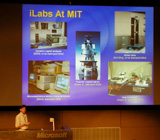
Brief Bio
Jesús del Alamo is Donner Professor and Professor of Electrical Engineering in the Department of Electrical Engineering and Computer Science at MIT.
He holds degrees from Polytechnic University of Madrid (Telecommunications Engineer, 1980), and Stanford University (MS EE, 1983 and PhD EE, 1985). From 1977 to 1981 he was with the Institute of Solar Energy of the Polytechnic University of Madrid, investigating silicon photovoltaics. From 1981 to 1985, he carried out his PhD dissertation at Stanford University on minority carrier transport in heavily doped silicon. From 1985 to 1988 he was research engineer with NTT LSI Laboratories in Atsugi (Japan) where he conducted research on III-V heterostructure field-effect transistors. He joined MIT in 1988.
Over the years, Prof. del Alamo has carried out research on transistors and other electronic devices in a variety of material systems. His research has involved Si solar cells, Bipolar Junction Transistors, and Metal-Oxide-Semiconductor Field-Effect Transistors (MOSFETs); SiGe heterostructure devices; GaAs, InP, InGaAs, and InGaSb High Electron Mobility Transistors, MOSFETs, FinFETs and Vertical Nanowire MOSFETs and Tunnel FETs and more recently Diamond MOSFETs. He has also investigated quantum-effect devices based on AlGaAs/GaAs heterostructures. His current research interests focus on the physics, technology, modeling and reliability of III-V compound semiconductor field-effect transistors for future logic and THz applications. He is also interested in fundamental reliability physics of GaN transistors for RF power amplification and power switching applications. More recently he is involved in exploring the potential of ferroelectric HfZrO2 and proton-intercalation electrochemical devices for analog non-volatile memory applications for future neuromorphic computing systems.
Prof. del Alamo's students have earned numerous best paper awards at national and international conferences. For his research on InGaAs and GaN transistor technology and reliability studies he was awarded the 2012 Intel Outstanding Researcher Award in Emerging Research Devices, the 2012 Semiconductor Research Corporation Technical Excellence Award, the 2019 University Researcher Award by Semiconductor Industry Association and Semiconductor Research Corporation, the 2020 IPRM Award and the 2021 IEEE Cledo Brunetti Award.
Prof. del Alamo teaches undergraduate and graduate-level courses in electronics, electron devices and circuits, micro/nanofabrication technology and advanced semiconductor device physics. At some point, he was also involved in exploring the potential of internet-accessible laboratories for science and engineering education. He has received numerous teaching and achievement awards at MIT. In 1992 he was awarded the Baker Memorial Award for Excellence in Undergraduate Teaching. In 1993 he received the H. E. Edgerton Junior Faculty Achievement Award. In 2001, he received the Louis D. Smullin Award for Excellence in Teaching. In 2002, he received the Amar Bose Award for Excellence in Teaching. In 2003, he was named a MacVicar Faculty Fellow. In 2007, Prof. del Alamo was appointed Donner Professor, a distinction that continues to today. In 2012, he was awarded the IEEE 2012 Electron Devices Society Education Award "For pioneering contributions to the development of online laboratories for microelectronics education on a worldwide scale."
From 1991 to 1996, Prof. del Alamo was a National Science Foundation Presidential Young Investigator. In 1999 he was elected a corresponding member of the Royal Spanish Academy of Engineering. In 2005, he was elected a Fellow of the IEEE and in 2014 he was elected a Fellow of the American Physical Society. In 2015 he was granted a Doctor Honoris Cause by Universidad Politecnica de Madrid. He was elected a Fellow of the Materials Research Society in 2019.
Among other service activities, Prof. del Alamo was Editor of IEEE Electron Device Letters from 2005 to 2014. From 2013 to 2019, he was Director of the Microsystems Technology Laboratories at MIT. From 2019 to 2022, he served as Editor-in-Chief of IEEE Electron Device Letters.
